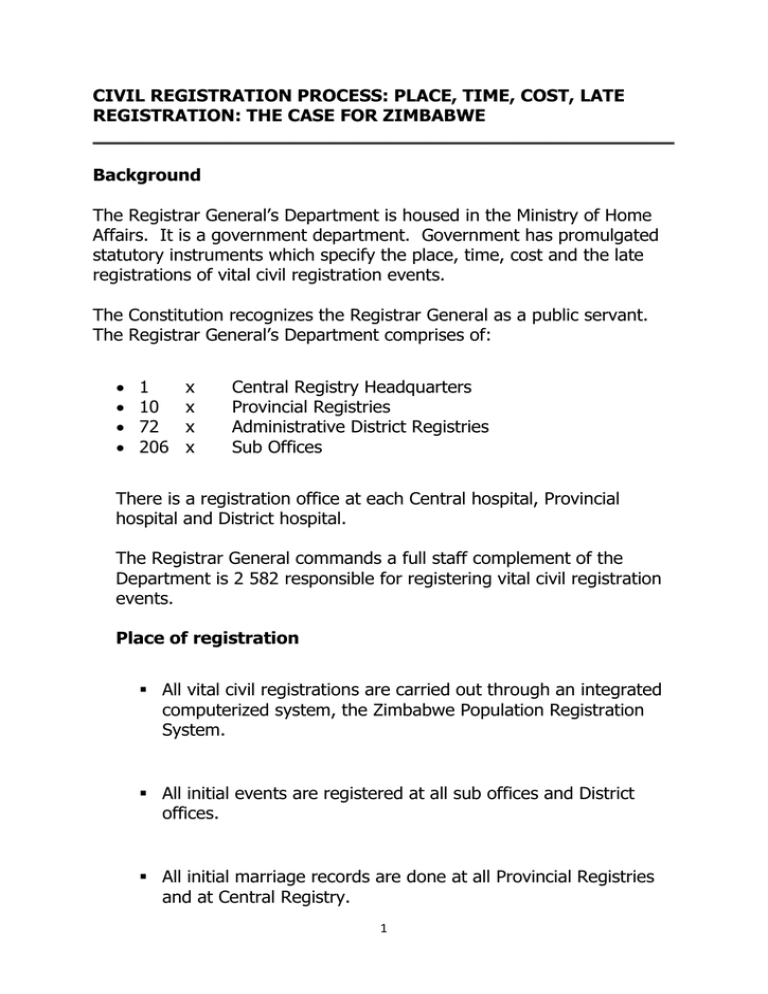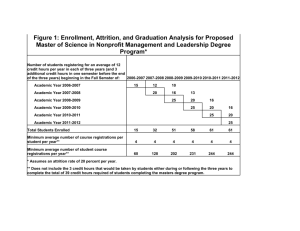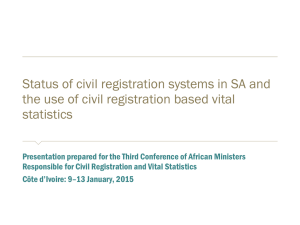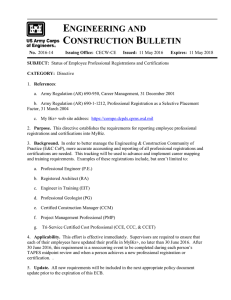CIVIL REGISTRATION PROCESS: PLACE, TIME, COST, LATE Background ___________________________________________________________
advertisement

CIVIL REGISTRATION PROCESS: PLACE, TIME, COST, LATE REGISTRATION: THE CASE FOR ZIMBABWE ___________________________________________________________ Background The Registrar General’s Department is housed in the Ministry of Home Affairs. It is a government department. Government has promulgated statutory instruments which specify the place, time, cost and the late registrations of vital civil registration events. The Constitution recognizes the Registrar General as a public servant. The Registrar General’s Department comprises of: 1 10 72 206 x x x x Central Registry Headquarters Provincial Registries Administrative District Registries Sub Offices There is a registration office at each Central hospital, Provincial hospital and District hospital. The Registrar General commands a full staff complement of the Department is 2 582 responsible for registering vital civil registration events. Place of registration All vital civil registrations are carried out through an integrated computerized system, the Zimbabwe Population Registration System. All initial events are registered at all sub offices and District offices. All initial marriage records are done at all Provincial Registries and at Central Registry. 1 All initial external births are registered at Central Registry. For a child born in a medical institution, a birth confirmation record and the parents’ national identity documents are required to register the child. The birth confirmation record states the place of birth, in this case the name of the medical institution where the child was born. For a child born outside a medical institution, the midwife is required as a witness and/or a letter from the village head to confirm the birth in the given locality together with the parents’ national identity documents. Time The timeliness of the registrations is embedded in the law. The law: Provides for mandatory vital civil registration. Provides registration of births to be within 42 days. Provides for the registration of national identity documents for children on attaining the age of 16 years. Provides for prosecution for late registration although this was never pursued. It was felt that citizens should willingly embrace and welcome civil registration rather than view it as punitive. 2 Late registrations There are policies in place which cater for late registrations. All births registered for children aged 1 – 6 years are issued for free. All national identity documents registered at 17 years and above attract a nominal fee of US$2-00. Cost Government is responsible for funding vital civil registration operations through an annual budget. All funding from government is subject to auditing. There is nothing called free registration of vital civil events since every registration has a hidden cost. The service to citizens is provided for free but the documents, machinery, consumables, labour, rentals etc. are paid for by government. None of these costs are transferred to citizens to pay. All vital civil registration documents are purchased from suppliers. All consumables for national identity documents are bought. All civil registration operations including national mobile registration exercises are borne by government. That is why government provides an annual budget to civil registration. All the registration fees are gazetted. All initial vital civil registrations services are issued to clients for free. 3 All duplicate birth registrations attract a US$5-00 charge. All duplicate national identity documents attract a US$2-00 charge Some causes of late registrations For births: Prolonged paternity disputes between spouses One or both spouses residing outside the country Spouses insisting on consulting relatives on the name of the child Mother said to be recovering from caesarian operation Absence of an incentive to register early One or both parents not having documents even in some cases their parents For national identity documents: Some children drop out of school and do not register early For death registrations: 4 There is a general lack of appreciation by society to register early especially in rural areas. Registration becomes critical when dealing with the deceased’s pension or estate. High burial costs in urban areas are prohibitive. Some deceased persons are taken in the middle of the night to rural areas for burial. N.B. Registrations are done at static offices. The Department also carries out a national mobile registration to complement registration centres. The intention is to reach the remotest areas and bring registration closer to the people. This is however dependent on availability of funds. ________________________________________________________ 5



